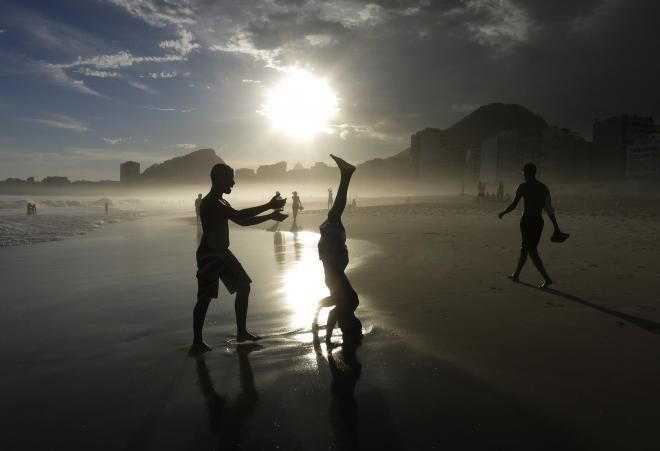Rape Of Tourist On Rio Bus Highlights Safety Concerns For World Cup, Olympics

Police in Rio de Janeiro arrested three men Monday accused of kidnapping a tourist couple from a minibus, beating the male and raping the female. The incident underscores concerns about Rio’s ability to safely host visitors from around the world for the 2014 World Cup and 2016 Summer Olympics.
The first two suspects arrested were identified as 20-year-old Jonathan Foudakis de Souza and 22-year-old Wallace Aparecido de Souza Silva. A third man, Carlos Armando Costa dos Santos, 21, was arrested later, the BBC reported. He allegedly boarded the bus outside of Rio and also raped the female tourist.
Two men boarded the minibus in Rio’s popular Copacabana area shortly after midnight Saturday and ordered other passengers to get off. They subsequently raped the woman over several hours as the minibus crossed Guanabara Bay and headed out of town, police said. The victim’s boyfriend was handcuffed and badly beaten.
The tourists were also forced to use their credit cards for shopping and withdraw money from ATMs before they were dumped in the nearby city of Itaborai six hours after being comandeered, according to the police report.
Police added that a Brazilian woman had come forward to say Foudakis and Aparecido also assaulted her on March 23.
“The characteristics of both crimes, both the Brazilian case and the one with the foreigners, lead us to believe that they wanted to have a 'party of evil'," Alexandre Braga, head of the Rio police unit specializing in crimes against tourists, told Globo television. "The principal motive appears to have been the satisfaction of their lust."
Braga noted that the robbery and associated crimes appeared to be secondary to the rape.
Officials have not released the identities or nationalities of the victims, but the U.S. Consulate in Rio confirmed Monday it had been working closely with the Tourist Police because one of the victims was a U.S. citizen.
Local media reports claimed the woman was American and that the couple had been in the city for a month studying Portuguese. They both reportedly left the country immediately following the attack.
Rio has long had problems with robberies, particularly on city buses, but the scale of this attack shocked local media, who are struggling to portray the city as one that is ready to host the world.
Rio recently launched a citywide offensive against crime in preparation for its spotlight on the global stage. Police, backed by army troops, initiated a campaign of “pacification” to take back control of the notorious favelas from powerful drug traffickers. The hope is that it will not only improve the city’s image, but also its safety record.
Rape remains a major issue across Brazil. Reported cases rose by 157 percent between 2009 and 2012, with Rio alone recording 16 cases per day last year, according to the country’s health minister. The ministry attributed the dramatic rise to a change in the criminal code in 2009 that expanded the legal definition of rape, but many believe sexual violence is on the rise.
The Brazilian media was quick to draw parallels between Saturday’s attack and the infamous gang rape in Delhi last December, where a 23-year-old university student was fatally assaulted in front of her male friend after they boarded a private bus. The incident sparked an international campaign to improve the plight of women in India. It also cost the nation’s tourism industry dearly. A new report claims that India received 35 percent fewer female visitors in the first three months of 2013 and 25 percent fewer visitors overall.
That’s the last thing Brazil needs as it gears up for a string of high-profile events, beginning with Pope Francis’ first international trip in July. The pope is expected to greet millions of young people in Rio in honor of World Youth Day. Next, the city will host several major matches in the 2014 World Cup before it takes on its largest role as Olympic host city.
Police hope their rapid response to Saturday’s attack will be proof that they have zero tolerance for violence against visitors.
© Copyright IBTimes 2024. All rights reserved.






















